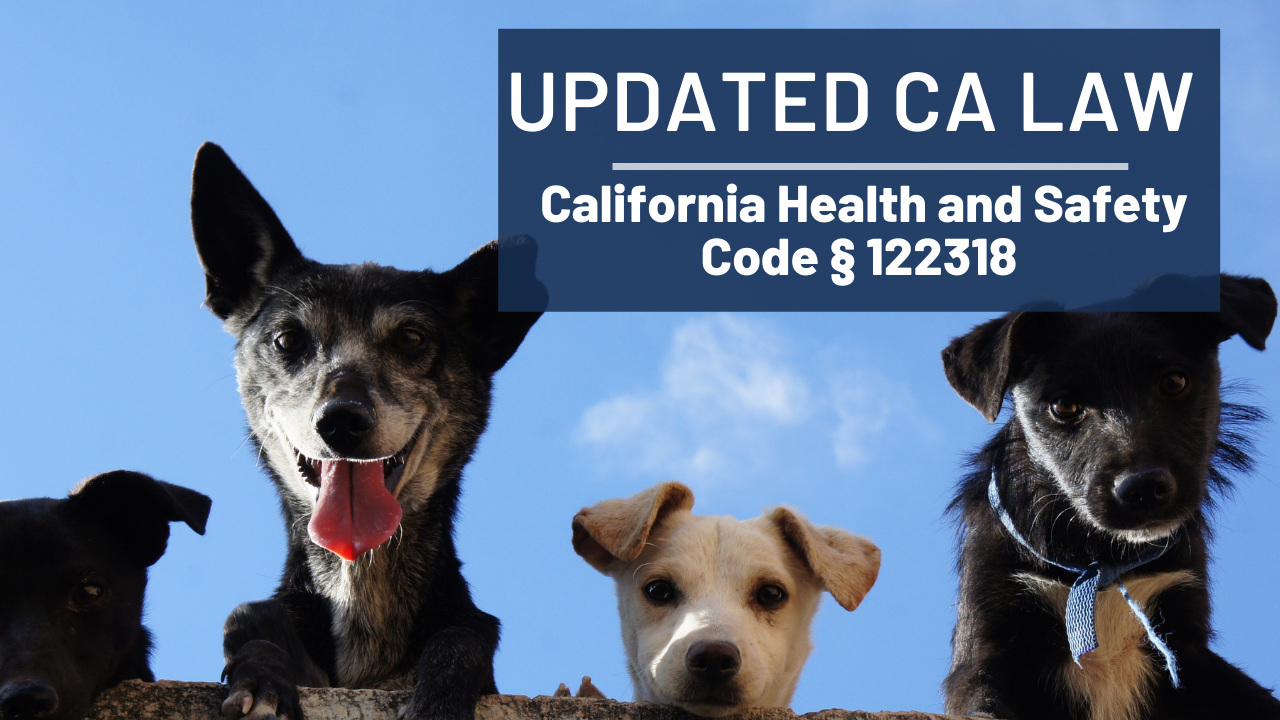New California law effective January 1, 2022 imposes specific obligations on health care practitioners (HCP) in California who provide documentation relating to an individual’s need for an emotional support dog. Among other requirements, the statute says a California HCP shall not provide such documentation unless the HCP establishes a client-provider relationship with the individual for at least thirty days prior to issuance of the documentation. While there have been some suggestions that California housing providers can now require ESA letters that comply with this new statute, we at PetScreening think that interpretation is inconsistent with existing federal and state law relating to assistance animals in housing.
First, the new law regulates HCPs and is not part of the federal and state law pertaining to a person’s rights for reasonable accommodation and equal access to housing. Indeed, the new HCP law was included in a health and safety bill intended to limit false representations about the rights and privileges accorded by law to service dogs, and covers persons selling emotional support dogs, for example, who now have to provide written notice that the animal is not a service dog. (Note, the new requirement relates only to emotional support “dogs”, not animals generally). As to HCPs, the new law is enforced by the respective licensing board which can discipline an HCP who does not comply. While we understand that a person seeking an ESA letter for a dog from a California HCP may now have to wait thirty days for an ESA letter, that does not mean that housing providers can require that only letters meeting this standard will support a request for accommodation for an assistance animal. Federal law and HUD regulations do not impose any 30-day requirement on ESA documentation, nor do the relevant provisions of California law relating to assistance animals and reasonable accommodations. PetScreening reached out to the primary sponsor of this specific legislation and had a series of calls with her, her staff, and an attorney from the Office of Legislative Counsel. It is our understanding after these conversations that the bill does not change or alter a landlord’s approach to reasonable accommodations but, rather, addresses HCPs.
We fear a housing provider would risk violating relevant housing laws if it imposed a rule or practice that it would not accept any documentation supporting an ESA that did not meet the narrow 30-day requirement of this new law. For example, suppose a person was moving to California from another state and presented a recent letter from her medical provider in her former state. Could the housing provider simply refuse to consider this document and require the applicant to visit a California HCP to secure a new letter, waiting at least 30 days? We think not, and we expect a fair housing complaint on the issue would not fare well for the housing provider. Also, California regulations relating to reasonable accommodations provide that information confirming that there is a disability-related need for an accommodation may be provided by “any reliable third party who is in a position to know about the individual’s disability or the disability-related need for the requested accommodation,” including medical professionals, HCPs, peer support groups, a non-medical service agency, or “[a]ny other reliable third party” including a relative or caregiver. CA Code of Regs. § 12178(g).
In short, Bell Properties, and our pet screening company, PetScreening intends to continue its review process consistent with federal law and HUD guidelines, with consideration for relevant state laws that are not more restrictive than federal law. For housing providers who want to pursue a more “aggressive” approach to assistance animal reviews, you might know that PetScreening’s software permits settings that allow housing providers to review and participate in the review process and take actions prior to the result of PetScreening’s analysis being communicated to the animal owner. Please reach out to your PetScreening account manager for further information about these settings. CA Health and Saf. Sec. 122318 Documentation of an individual's need for emotional support dog by health care practitioner (California Code (2022 Edition))
122318. Documentation of an individual's need for emotional support dog by health care practitioner
(a) A health care practitioner shall not provide documentation relating to an individual's need for an emotional support dog unless the health care practitioner complies with all of the following criteria:
(1) Possesses a valid, active license and includes the effective date, license number, jurisdiction, and type of professional license in the documentation.
(2) Is licensed to provide professional services within the scope of the license in the jurisdiction in which the documentation is provided.
(3) Establishes a client-provider relationship with the individual for at least 30 days prior to providing the documentation requested regarding the individual's need for an emotional support dog.
(4) Completes a clinical evaluation of the individual regarding the need for an emotional support dog.
(5) Provides a verbal or written notice to the individual that knowingly and fraudulently representing oneself to be the owner or trainer of any canine licensed as, to be qualified as, or identified as, a guide, signal, or service dog is a misdemeanor violation of Section 365.7 of the Penal Code.
(b) For purposes of this section, "health care practitioner" means a person who is licensed and regulated pursuant to Division 2 (commencing with Section 500) of the Business and Professions Code, who is acting within the scope of practice of the person's license or certificate.
(c) A health care practitioner may be subject to discipline from the health care practitioner's licensing board for a violation of this section.
History: Added by Stats 2021 ch 168 (AB 468),s 1, eff. 1/1/2022.
Need information about how Bell Properties serves and protects our owners? Get in touch with us today, 800-341-3281 x 201


